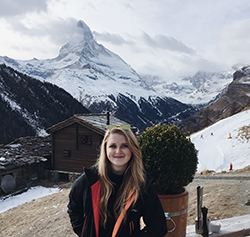As a fourth generation Ute with both grandfathers recipients of their B.S. in mechanical engineering here at the U, you might say that mechanical engineering senior Abigail (Abby) Campbell, of Salt Lake City, was destined to be an ME. Coming from a family of engineers, she stands out as the first woman engineer in the family.
Adding to her distinction, she is now one of 21 students selected nationally for the Los Alamos National Laboratory (LANL) Dynamics Summer School (LADSS). She will be partnered with a LANL staff member as a mentor for an intense nine-week research activity on a three-person multidisciplinary team.
Advised by mechanical engineering associate professor Bart Raeymaekers, she is a member of the Utah Tribology and Precision Engineering Laboratory. Campbell said, “My area of research focuses on improving the longevity of prosthetic hip implants. More than 300,000 total hip replacement surgeries are performed annually in the United States, with each implant typically lasting 10-15 years before needing replacement. This requires intense and invasive revision surgery, which can be hard on the patients. By increasing the longevity of the original implant, we are able to delay the need for a replacement surgery, and improve patient comfort.”
A hip implant consists of a Cobalt Chromium (CoCr) femoral head, anchored in the femur, which articulates with a polyethylene acetabular component that is implanted into the socket of the hipbone. Previous research in the Nanotribology and Precision Engineering lab, has demonstrated that adding a patterned microtexture to the CoCr head increases synovial lubricant film thickness when articulating with the polyethylene acetabular component. This increase in lubricant film thickness reduces contact between the two articulating components of the prosthetic hip implant, which reduces wear and increases longevity.
“The objective of my research project,” adds Campbell, “is to simulate and experimentally measure the coefficient of friction between flat microtextured CoCr and polyethylene surfaces using a pin-on-disk tester. This project will reveal how different microtexture designs affect the friction coefficient between textured CoCr and polyethylene surfaces, which will be related to lubricant film thickness, and polyethylene wear.”
 Of her journey to becoming an ME, Campbell said, “I have always loved math, problem solving, and understanding how the world works. Engineering gives me the opportunity to explore all of that while learning how to use that knowledge to help the world! After I graduate, I plan on pursuing a master’s degree in mechanical engineering. I am excited to spend the summer at Los Alamos and to learn everything I can to further my education and prepare me for a successful career as an engineer!”
Of her journey to becoming an ME, Campbell said, “I have always loved math, problem solving, and understanding how the world works. Engineering gives me the opportunity to explore all of that while learning how to use that knowledge to help the world! After I graduate, I plan on pursuing a master’s degree in mechanical engineering. I am excited to spend the summer at Los Alamos and to learn everything I can to further my education and prepare me for a successful career as an engineer!”
In her free time she enjoys playing soccer, skiing, and running, as well as playing the violin in local orchestras, and traveling. To learn more about Campbell and her research visit the Utah Tribology and Precision Engineering Laboratory.
The LADSS program is designed to aid all undergraduate and graduate students entering into research fields that are heavily related to dynamic modeling. The LADSS projects and lectures in particular are based around topics such modal analysis, system identification and validation, as well as nonlinear systems. Furthermore, a good portion of the program is designed not only to technically educate, but also to help students develop professional skills such as grant and research paper development.